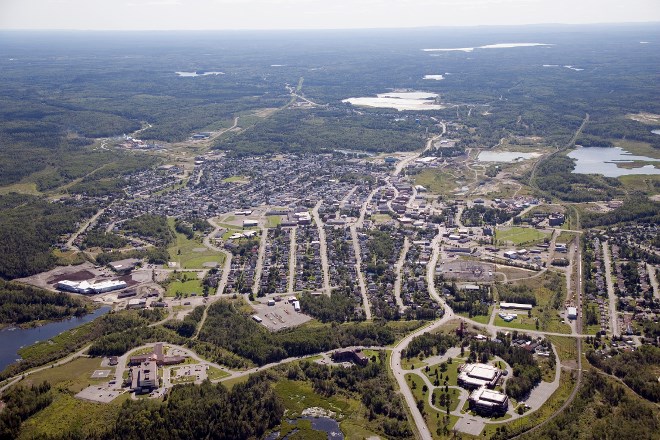Consolidation in the Canadian cannabis sector hit home this week for workers at a cultivation facility outside Kirkland Lake.
Hexo Corp, which acquired 48North Cannabis last summer, announced Nov. 10 that its Delshen indoor cultivation facility, located between Kirkland Lake and Matachewan, would be "decommissioned" at the end of January.
It is one of three plants in Ontario and Nova Scotia the Ottawa-based commercial grower and manufacturer is permanently shuttering early next year.
The facility, situated on Highway 66, a half-hour's drive west of Kirkland Lake, entered commercial production under the 48North flag in 2017.
The news caught Kirkland Lake Mayor Pat Kiely off guard.
Though he had little contact with the new owners, he was under the impression Hexo acquired the operation to expand it by a couple hundred thousand feet.
He estimates the facility employs close to 50, half of whom are from Kirkland Lake.
Want to read more stories about business in the North? Subscribe to our newsletter.
"Some of the problems I knew they were having, in discussions we've had with them, was getting labour and the costs of supplies to the North, and I would think that was the same thing that might have happened to the Nova Scotia (facility) too.
Kiely acknowledged the loss of the operation will have some effect on the local economy, but said the wider business spinoffs will be marginal. The company did not do much local spending.
"At times you never know they were there."
The 40,000-square-foot indoor operation was inside a former provincial tree nursery situated on 800 acres of private land. It produced more than 2,500 kilograms of dried cannabis flower annually.
Its 40,000-square-foot Delshen cultivation facility at Kirkland Lake is licensed to sell cannabis as well as produce and extract cannabis oils. The facility produces 2,500 kilograms of dried cannabis flower annually.
There had been plans to add 200,000 square feet of production space on the property to allow for production of an additional 40,000 kilograms of dried cannabis flower each year, with interest in adding production of oils and edibles.
In an emailed reply, Hexo spokesperson attributed the shutdown to a company decision to centralize product cultivation, manufacturing and distribution at its core facilities after carrying out a "comprehensive review of all Hexo facilities." The company did not provide a response on its plans for the site, by way of selling equipment and putting the facility on the market.
Kiely, who once toured the facility, called it "quite impressive."
"What they've got invested there, it's kind of a single-purpose property," he said.
"I don't see them selling it to competitors, perhaps a greenhouse or something."
Kiely dismissed the notion his municipality would pick up the property and attempt to revive it.
"We have a number of projects on the go in Kirkland Lake. There are other priorities, to tell you the truth."
But the turn of events, Kiely said, underscores the need for communities to remain economically diverse.
"It kind of highlights to Northern Ontario that we have to look at diversification and bringing in other industries and getting government help because we just can't rely on this type of a market that they were promoting."
The loss of those jobs may be offset by a mini-boom in gold mining activity and a new green energy player from southern Ontario coming to town in the form of CHAR Technologies.
Kiely said he met yesterday with the principles from CHAR along with provincial government officials from the Ministry of Northern Development, Mines, Natural Resources and Forestry for an update on the company's plans to situate a new clean technology plant there, in the form of a biomass-burning kiln.
The growth-minded company has developed a high-temperature pyrolysis process that takes woody material and organic waste and converts it into a renewable natural gas (RNG) and biocoal products.
CHAR has optioned a property in the town's Archer Drive industrial park, close by the Rosko Forestry sawmill.
Kiely said the company has letters of intent to receive biomass feed from area saw mill operations.
The company hopes to leverage that support and their leading-edge technology to tap into provincial and federal funding to help set up shop in town. Kiely said they're in the early stages of sending in those funding requests.
Kiely said the company's eco-friendly technology has been well received locally, especially since there's an ample supply of raw material feed in the area.
The proposed operation would create 10 to 12 jobs initially, with two kiln modules, but could generate more employment if there is significant customer uptake.
CHAR president Andrew White told Northern Ontario Business last month that they were close to signing a long-term deal with a Quebec energy company. As well, there are number of existing and emerging gold mine and mill operations in the area that might become customers.
In town, Kirkland Lake Gold is driving a new shaft for an underground expansion at its Macassa Mine. That company is merging with Agnico Eagle, which is advancing its Upper Beaver deposit, east of town, into production, bringing with the possibility of 400 news jobs to the area.




